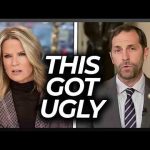The once-revered BBC is in freefall after a string of editorial scandals exposed a partisan streak that many Britons simply will not tolerate. Households are voting with their wallets, and officials now estimate that lost licence-fee income and evasion together represent more than a billion pounds in potential revenue — a crushing blow to a broadcaster that has long treated its public funding as sacrosanct.
This collapse did not happen overnight. Senior BBC figures have admitted mistakes after high-profile failures in editorial standards and programming, and the fallout has included sackings, resignations and a wave of public anger at what looks like institutional bias. The corporation’s leadership now finds itself on the defensive, asking for patience while taxpayers rightly demand answers for the propaganda they’ve been forced to fund.
The public’s response has been clear and measurable: hundreds of thousands of households have stopped paying the licence fee, with the total number of paid licences declining sharply and costing the BBC meaningful revenue. That exodus — roughly three hundred thousand or more in a single period — is not a trivial statistical blip; it is a revolt against a broadcaster that many feel has betrayed impartiality and common sense.
Behind the headlines, the mechanics of collection are creaking too. TV Licensing figures show rising evasion and mounting collection costs even as the BBC scrapes to trim a stubborn deficit and trim staff, proving that throwing more money at a broken system won’t restore trust or credibility. For every lecture on impartiality, there’s another story of heavy-handed culture and arrogant excuses — and the public isn’t buying it anymore.
Conservatives should look at this as a cautionary tale: when government or quasi-government bodies become preaching machines instead of public servants, taxpayers will push back. The licence fee is, in effect, a compulsory media tax that props up a left-leaning information monopoly; forcing citizens to bankroll a biased broadcaster is neither fair nor sustainable in a free society. It’s time to stop treating the BBC as untouchable and start treating it like any other organisation — accountable to consumers, not insulated by a government handout.
Politicians in both countries should take note and act boldly. Ministers are already being pressed to review the funding model and consider alternatives to the antiquated, coercive licence-fee system; the sensible course is to strip the BBC of special privileges, open the field to competition, and let viewers choose where to spend their money. Those who insist on taxpayer-funded broadcasting must accept scrutiny, reform, and, if necessary, a market solution that ends the state-enforced monopoly.
This moment is bigger than the BBC — it is a symptom of a broader cultural rot where institutions once trusted to inform have become platforms for partisan agendas. Patriots who love truth and who respect the sovereignty of taxpayers should cheer the public’s refusal to pay for propaganda, demand real accountability, and push for an honest media landscape where trust is earned, not assumed.




